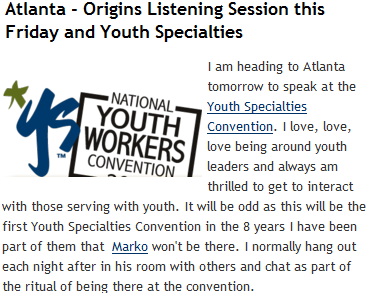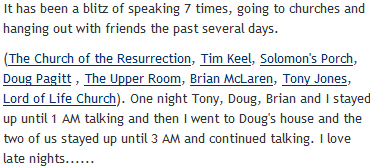DAN KIMBALL OF THE EMERGING CHURCH AND LECTIO DIVINA
By Ken Silva pastor-teacher on Jan 1, 2011 in AM Missives, Contemplative Spirituality/Mysticism, Current Issues, Emergence Christianity, Emergent Church, Features
 The one who states his case first seems right, until the other comes and examines him. (Proverbs 18:17)
The one who states his case first seems right, until the other comes and examines him. (Proverbs 18:17)
Apprising Ministries has been among those pioneering the mission filed of online apologetics and discernment ministry and it’s a well known fact that a major focus of mine has been the sinfully ecumenical neo-liberal cult of the Emergent Church aka the Emerging Church.
someone I know has been hurt from a recent series of inaccurate things reported on Christian “discernment” web sites and in the comments on those web sites. In fact, many people get hurt from these web sites all the time. So often from misrepresentation and those posting not having facts correct about people… It is far too easy for people to make judgments, so incredibly often it is by those who have not even read the books by the very authors they judge. Or taken the time to look at the accuracy of web sites who may quote a sentence or two but never look at the context it was written from.
I think that some (not all, but several) of these Christian discernment web sites and the people who comment on them and follow them don’t take these words of Jesus seriously [refers to John 7:24]. They judge by mere appearance. Not just the people who run the web sites, but also the people who make comments on them or link to them etc. They judge by appearance. They judge by guilt-by-association. They judge by taking sentences out of context to build a case for what they already pre-believe to prove their point. Almost cult-like actually, in how things can be twisted to make a point. (Online source)
I just think it is time for Christian discernment web sites to turn their focus on each other for a while. Like they do for “false teachers” in examining them, maybe they need to look out for “false discerners”. Figure out which ones are credible and which ones aren’t.
Discernment web sites need to be discerning each other. I wish they would develop some sort of screening system or a code of discernment tools to hold each other accountable to that. Use your discerning skills and truly discern each other for a change to weed out the false discerners from the true discerners. (Online source)
“Use your discerning skills and truly discern each other for a change.” Hmm, that sounds like it would also apply to leaders within the Emerging/ent Church as well, no?
(Online source)
Hi Ken!
Thanks for commenting! Yes, we should be discerning what we teach constantly through the lens of Scripture. Absolutely!
And with discernment web sites they should be doing that all the more since that is 100% of what they do and focus on. I believe so much of the poorly done discerning would be cleaned up if discernment web sites held each other accountable and screened each other and checked the accuracy of what they report as they do with those they discern in the church world.
Thanks again for the comment! Hope all is well! (Online source)
Dan,
“I believe so much of the poorly done discerning would be cleaned up if discernment web sites held each other accountable and screened each other and checked the accuracy of what they report as they do with those they discern in the church world.”
I know what you mean; so much of the poorly done teaching would be cleaned up if Emerging Church web sites held each other accountable and screened each other and checked the accuracy of what they teach by Scripture as they do with those “fundamentalists” in the church world they so love to criticize.
I’m just sayin’. Thanks again for the the chance to comment! Hope all is well too!
(Online source)
I was with about six or seven people once in Colorado, and someone said, “All right, we’re going to do Lectio Divina”; and they opened up to a passage in Scripture—I think it might have been the Psalms, I’m trying to remember, and they, you know, it was like “all right.” And I’d never heard of it before, but then that’s what it was called; sit around in a circle and someone just starts, y’know, and they’ll like open up the Bible and they read a section—I’m opening up my Bible right now—and they read, say, “Psalm” and it was “The Lord lives. Praise be to my rock. Exalted be God my savior.” That’s Psalm 18:46.And then, they’d pause for a moment just like that and they’d say, “The Lord lives. Praise be to my rock. Exalted be God my savior.” An’ I think they read two or three verses and then w-went around the circle and I’m like, “You know that was refreshing!” We didn’t, you know, there was no mystical chanting, of like, losing your mind—it was—you’re reading a Bible verse, three or four times, and it was—it was actually—and what Irealized was it was just you were calming down for a moment, in the rush of meetings, and stuff that you were about to go into; and I’m like, “That was, I loved reading Scripture.” It was not the “emptying of mind” or’s going into some weird, meditative state of, you know, whatever. It was reading a Bible verse three or four ti[mes]—what the heck was wrong with that?
We have neglected so many of the disciplines of the historical church, including weekly fasting, practicing the silence [ala Desert Fathers], and lectio divina.[1]
In Roman Catholic, Eastern Orthodox, and Anglican churches, you’ll find a well-developed calendar and more set pattern of worship. In many American branches of the church, however, liturgical practices were removed and forgotten a long time ago. Yet among emerging generations there is a desire to embrace Christianity’s ancient forms of worship, which includes liturgy.
In the book Soul Shaper, Tony Jones explains a lot of ancient spiritual disciplines and shows how they can be attractive ways of worship for emerging generations. Lectio Divina, which is the practice of repeatedly meditating and praying through a passage of Scripture, and many other spiritual exercises are being reintroduced in emerging worship gatherings.
There is also a growing practice in emerging worship to focus on the Christian calendar, which is organized around two major seasons of sacred time: Advent. Christmas, and Epiphany; and Lent, Holy Week, Easter, and Pentecost. Churches that have used liturgy for some time are breathing new life into their “routine” practices. Other emerging worship gatherings are revising ancient practices.
Ok, now Dan Kimball is claiming he that he apparently doesn’t understand what actual Lectio Divina is, but this really doesn’t help his case at all because he’s the one who just said we need to: “Take time to learn the history of various expressions of worship.” So, did Dan not even take his own advice then? I mean, as I showed you previously in Spread Of Contemplative Spirituality/Mysticism: Lectio Divina, it’s also interesting to note that in his book Emerging Worship: Creating Worship Gatherings for New Generations, under “Helpful Books” Kimball himself recommends the below from Tony Jones, progressive/liberal “theologian in residence” at the church of his equally heretical quasi-universalist pastor Doug Pagitt.
You probably also know that both are part of the unholy trinity in the Emergent Church along with Living Spiritual Teacher and Emerging Church guru Brian McLaren:
Lectio divina was articulated further by Guigo II (c.1117-c.1198, the ninth prior of the Grand Chartreuse, a Carthusian order in France. In his book Scala Claustralium (The Ladder of Monastics), Guigo writes:One day I was engaged in physical work with my hands and I began to think about the spiritual tasks we humans have. While I was thinking, four spiritual steps came to mind: reading (lectio), meditation (meditatio), prayer (oratio), and contemplation (contemplatio). This is the ladder of monastics by which they are lifted up frtom the earth into heaven.. There are only a few distinct steps, but the distance covered is beyond measure and belief since the lower part is fixed on the earth and its top passes through the clouds to lay bare the secrets of heaven [Casey 59]These four steps have been foundational in the practice of the lectio divina ever since.[5]
For the past twenty-five years we have been sharing Centering Prayer in all parts of the world. In all our prayer workshops we have always included lectio. For the monk and nun, lectio and contemplation, Centering Prayer, are all part of one reality.[6]
“If this practice is promoted with efficacy, I am convinced that it will produce a new spiritual springtime in the Church,” stated the Holy Father. To promote “lectio divina,” Benedict XVI suggested “new methods, attentively pondered, adapted to the times.”…”lectio divina” became a mainstay of religious life. The monastic rules of Sts. Pacomius, Augustine, Basil and Benedict made the practice of diving reading, together with manual work and participation in liturgical life, the triple base of monastic life.The systematization of “lectio divina” in four steps dates back to the 12th century, explained the Holy Father. Around 1150, Guido, a Carthusian monk, wrote a book entitled “The Monks’ Ladder,” where “he set out the theory of the four rungs: reading, meditation, prayer and contemplation,” according to the Pope. “This is the ladder by which the monks ascend from earth to heaven.” (Online source)
Endnotes:
[6] M. Basil Pennington, Lectio Divina: Renewing the Ancient Practice of Praying the Scriptures [New York: Crossroad Publishing, 1998], ix.
See also:
SOJOURNERS OF JIM WALLIS TEACHES US LECTIO DIVINA
CONTEMPLATIVE SPIRITUALITY OF RICHARD FOSTER ROOTED IN THE EASTERN DESERT AND THOMAS MERTON
CHRISTIAN MATURITY AND HOW IT RELATES TO DISCERNMENT
WHAT IS THE ACTIVITY WE CALL ‘DISCERNMENT’ REALLY ALL ABOUT?
AM TESTIMONY: CONTEMPLATIVE SPIRITUALITY/MYSTICISM
DONALD WHITNEY AND EVANGELICAL CONTEMPLATIVE SPIRITUALITY/MYSTICISM
EASTERN RELIGIONS SOLD A REIMAGINED CHRISTIANITY TO THE WEST



